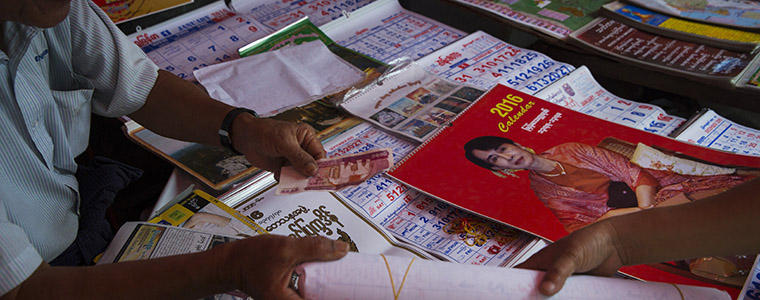On the Issues With Priscilla Clapp
Myanmar’s transition to representative democracy reaches another milestone on Feb. 1: A new parliament begins work with a majority of its members for the first time belonging to the National League for Democracy (NLD), the party led by Nobel Peace Prize laureate Aung San Suu Kyi. Priscilla Clapp, a former American diplomat in Myanmar and U.S. Institute of Peace specialist on the country, discusses the next steps and the likely effect of the change on Myanmar’s political, economic and societal transformation.
The NLD won its majority in largely peaceful elections on Nov. 8, replacing a legislative body that has been dominated by the military-inspired Union Solidarity and Development Party (USDP). Aung San Suu Kyi, released from detention in 2010, first joined the parliament in 2012, when her NLD party took 43 seats. Despite the overwhelming NLD majority now, the constitution requires that uniformed military officers retain 25 percent of the seats.
The new parliament will have to select a new president and two vice presidents by March 31 when the current chief executive, Thein Sein, steps down. Under what Suu Kyi believes is a constitutional provision drafted specifically to target her, she’s ineligible for the presidency because no one with children owing allegiance to a foreign government can hold the highest office, and her sons are British citizens.
How smoothly has the transition been going since the election and have you seen any effect on Myanmar society?
So far the transfer of the reins of government to the NLD was been remarkably smooth. Aung San Suu Kyi has met with the current leadership, including President Thein Sein, parliamentary Speaker Shwe Mann, and Commander-in-Chief Min Aung Hlaing, to discuss the outlines of the transition, and a joint NLD-USDP committee has been formed to work out the details. The outgoing parliament is completing matters that were suspended during the election break. It’s leaving controversial legislation to be decided by the new NLD parliament, rather than rushing it through.
The impact of a smooth transition on Myanmar society, while not visible, is undoubtedly immense, because the failed transfer of power in 1990 — when the NLD won a similar majority in general elections — is still fresh in their minds. As the size of the NLD win became apparent immediately after the election, many voiced concern that the military might once again find a way to prevent the NLD from taking office. So the pubic is holding its collective breath and hoping that this time will be different.
How much power can the NLD majority wield, with the military controlling 25 percent of the seats in parliament?
With its decisive majority, the NLD will be able to choose all the parliamentary leadership and most of the leadership in the executive branch, including the president and first vice president. It will also have the deciding vote on all legislative matters that do not involve changes to the constitution. This will allow the NLD to draft new, more democratic laws and policies, which could dramatically improve human rights and democratic development over the coming five years.
The military, of course, will continue to control several key levers of political power. The generals will have an effective veto over any changes to the constitution, since a constitutional amendment requires approval by a majority greater than 75 percent. The military representatives in parliament also name one of the three candidates for president, who will inevitably become a vice president. Beyond legislative influence, the military retains control of the ministries of Defense, Home Affairs, and Border Affairs, keeping the army effectively in charge of the nation’s internal security and local administration.
What will be the NLD priorities in parliament?
The fact is much of what the NLD would like to do will have to be negotiated with the military because of its veto powers and control of key ministries. Within that context, the NLD is likely to seek fundamental changes to both legal and structural governance of the country over the coming five-year term. Senior NLD officials have already indicated that among their priorities will be the release of political prisoners; development of legal restrictions against jailing people for political reasons in the future; renewal and reorientation of the peace process to end the country’s decades of civil war; consolidation and restructuring of existing ministries; tackling the sources of communal violence between Rakhine Buddhists and Rohingya Muslims in Rakhine State; and seeking amendment of the constitution.
Aung San Suu Kyi has indicated that she won’t press for a constitutional amendment in the near future, though, because she believes it should be done gradually. She undoubtedly has her relations with the military in mind, since there will be many other important issues, not least the peace process, that will depend on the goodwill and cooperation of the military to resolve.
What role is Aung San Suu Kyi carving out for herself if she can’t be president?
Aung San Suu Kyi has said she intends to be “above the president,” and there’s much speculation in Myanmar as to how she intends to accomplish that. She will remain in the parliament as head of the NLD party. She could be elected speaker of the Lower House, which many have assumed would be the case. However, the rumor mill now indicates that she may not wish to have a formal leadership role, but rather remain active behind the scenes guiding the leadership she puts in place in both the parliament and executive branch, including the new president. This would require some very deft maneuvering, but it would have the advantage of leaving her free of day-to-day administrative responsibilities, in order to concentrate on policy and restructuring government.
